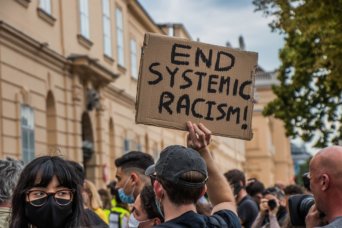- About
- Topics
- Picks
- Audio
- Story
- In-Depth
- Opinion
- News
- Donate
- Signup for our newsletterOur Editors' Best Picks.Send
Read, Debate: Engage.
While the protests against police violence and racism have been flooding countries around the world for weeks, the Russian public remains mostly indifferent to the Black Lives Matter agenda.
Remarkably, this is not because of the Russian mass media keeps the protests in Northern America and Europe off the radar. On the contrary, the footage from U.S. cities, Brussels, London and Paris have been in the top news on all Kremlin-controlled television channels. The commentators present the BLM protests as "people uprising against corrupted capitalist governments" and similar Cold War-like wording.
For the state media, coverage of the BLM movement has been a sensitive topic, because they have to navigate between Scylla and Charybdis of presenting the protests as a sign of "decaying liberal ideology" while trying not to make parallels with domestic police violence too obvious.
The prevailing tone of the comments in the Russian official media is that the BLM "epidemy" is as destructive for Western society as coronavirus pandemic has been.
Russian authorities must be overly cautious in their concerns because BLM-type protests would affect Russia in no circumstances, leader of the "Russia Against Racism" movement, a sociologist from St-Petersburg Alexander Vinnikov believes.
"What the Russian public, thanks to the state-controlled mass media, perceives as anarchy, is, in reality, the way Western democracy works. The possibility of citizens protesting is 'preinstalled' into Western institutions. This is why the BLM protests are not a revolution, nor are they a civil war," he says.
Vinnikov reminds us that the U.S. Constitution's opening line "We the people" highlights the huge difference between American and Russian society's self-perception.
"Any comparison between current public disorders in the United States and ethnic conflicts in Russia is wrong. This is like comparing green with salty. Unlike the West, a self-conscious society has never existed in Russia. While in the United States, street protests are more or less a 'normal' way of communication between the people and the government, in Russia this is a preserve of a few," he adds.
Russia and the USA have been on different stages of their social evolution, the activist stresses. Still, no one shall expect that the elements of the American social-political system will one day, even in a century, emerge in Russia.
"This is as senseless as expecting that a cow will one day evolve into a horse," Vinnikov explains.
"Russia lacks 'the people' in the US sense of the word. In Russia, for the people to come to the streets, they always need a leader who shows the way to the 'folk'. In the U.S., people self-organise instinctively, horizontally. This is why the U.S. political system has been generally immune to the protests and learned to discharge the tensions, not letting it reach the terminal stage," Vinnikov is convinced.
Russian mass consciousness, in contrast, is immune to the fears planted by decades of "political correctness" in the West, head of the Center for Migration Policy in the High School of Economics Olga Chudinovsky says: "It's utterly impossible to draw parallels between racial relations in the U.S. and Russia. The murder of George Floyd, in many respects, was just a spark that ignited the protests of the underprivilege groups which happen to represent mostly the young people of color in the U.S. In Russia, the economic and social inequality divides the country along the other lines, not ethnic or racial," she notes.
Chudinovsky points out that there is nothing in common between African-Americans in the United States and visible minorities in Russia in terms of their self-perception in the respective countries.
"BLM's social base is the US citizens in many generations, so they have a legitimate right to make demands from their authorities. In Russia, the migrants are, mostly, non-citizens, so they have no ground to demand anything from the Russian government. This is why visible minorities in Russia behave as quiet as a grave and only raise a ruckus, if ever, at their embassies gates," she concludes.
Image by UnratedStudio

